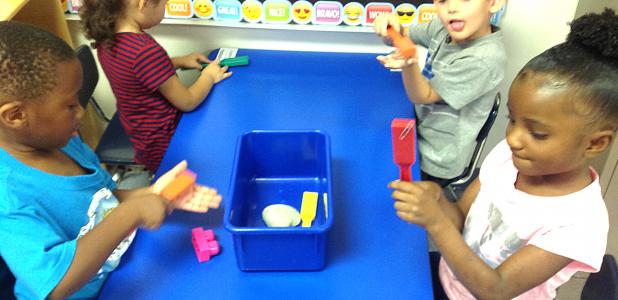Mae Stevens Elementary Pre-K students stuck on science lesson
Special to Leader-Press
In teacher Mandy Hunt’s pre-K classroom, magnets are on the white board holding up students’ work. Magnetic letters are in the A-B-C center and are attracted to a metal pan. This is where the very sticky lesson began.
After reading a book about the wonderful world of science, Hunt, a pre-K4 teacher at Mae Stevens Early Learning Academy, began to show the students that magnets will stick to different metal objects but will not stick to everything.
“One of the best ways I know to get students excited about science is to do a science experiment. This also help the students learn the scientific process,” Hunt said.
For their very first science project in pre-K, Hunt and her students spent some time looking, inspecting and searching their classroom, hallways, cafeteria, the playground and everything their eyes could take in. That’s when the students noticed the magnets in the class room.
“The students and I soon came up with the question. ‘Do magnets stick to everything?’ Next, we came up with our hypothesis,” Hunt said. “We noticed all the things that magnets stick or are attracted to and hypothesized that magnets stick to all things. Next, we came up with a way to test our hypothesis.”
The students pulled out different objects and put a magnet next to each one. Each student had an opportunity to test the class’s hypothesis. Then, the classed worked together to record their data, taking turns writing if the magnet attracted an object or not. They created a science board with all of their findings.
“We observed that things made out of rubber, wood, and plastic do not stick to or are not attracted to a magnet. So, our hypothesis was wrong but we still learned something. We learned not all things stick to or are attracted to magnets,” Hunt said.
Four-year old Karra Fischer tested the magnet with two different items to see if it would stick.
“The magnet didn’t stick to the seashell or the eraser because it’s made of rubber like our shoes,” she said, circling the correct answer on her data sheet.
J’Kai Bunton, 4, tried to stick the magnets to a different substance but was also not successful.
“The block did not stick (to the magnet) because it’s made of plastic,” Bunton said.
Although pre-K students do not have required Texas Essential Knowledge and Skills to master, they do have TEKS guidelines that include problem solving through science experiments.
“This was a fun way to get the students excited about science and the scientific process,” Hunt said. “The students cannot wait for our next science lesson where each student will get the chance to explore different science tools.”

